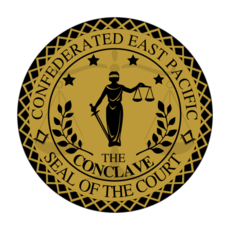The Conclave hereby announces…
A request from Citizen Zukchiva Yura to review the Amendments for the Concordat passed in 2019.
LAW IN QUESTION: The Concordat
QUESTIONS:
-
In February 2019, the Magisterium & Citizenry passed a Concordat re-write which stated in part: “Section 1) This Concordat recognizes itself as the descendant of the first concordat of The East Pacific, which took effect following a ratification vote of nations of The East Pacific, as overseen by the Elders. This Concordat repeals and replaces said elder concordat.” Would this have made the February 2019 Concordat a repeal and replace of the previous iteration of the Concordat, or is this an amendment to the previous iteration?
-
If it was a repeal and replace, considering the pre-Feb. 2019 Concordat had no mechanism for a repeal and replace, would this make all following iterations of the Concordat illegal? If so, will the Conclave strike them down (does it even have the power to)? What about all our laws passed since that time?
The following procedures will be followed. The Conclave shall, according to its standing orders, convene to determine whether to confirm this request. If it does so, it shall then deliberate and reach a verdict on the questions raised for review within the time period allocated under the Standing Orders.
— Begin quote from ____
2.1.1- Judicial Review of a Law shall take place following its passing, its request by the Delegate, a Magisterial Vote, a Vizier Vote, a citizen with a confirmation vote by the Conclave, or a constitutional challenge by a citizen in a civil trial. A Review shall last no more than 7 days but may be extended 3 days at the request of an Arbiter.
2.1.2- Upon receipt of request, the Viceroy shall initiate public and private threads which outline the bill in its entirety, along with the end-date for the deliberation of the law.
…a. The public thread shall be available for citizens to refer precedent or applicable laws to the Conclave, but subject to censure at the request of any Arbiter.
…b. The private thread shall contain the deliberations of the Conclave and be used to draft verdicts and debate the law.
2.1.3- The Review shall rule on the interpretation or constitutional validity of a law, factoring the Concordat, all applicable statutory laws, precedent of the court, and traditional values of The East Pacific for their deliberations.
2.1.4- Draft verdicts are prepared by Arbiters, listing reasoning and legal references to be voted upon.
…a. For the first vote, a draft verdict may only pass by unanimity.
…b. If the vote fails, consequent votes shall be held until a draft verdict receives majority support.
…c. The dissenting minority of Arbiters may choose to file a minority report of their verdict to be appended to the majority verdict.
2.1.5- The majority verdict of a Judicial Review shall take full force of law and shall form precedence for that and similar laws. The verdict may rule on including, but not limited to: constitutionality, applicability, meaning, or validity as a law.
— End quote
